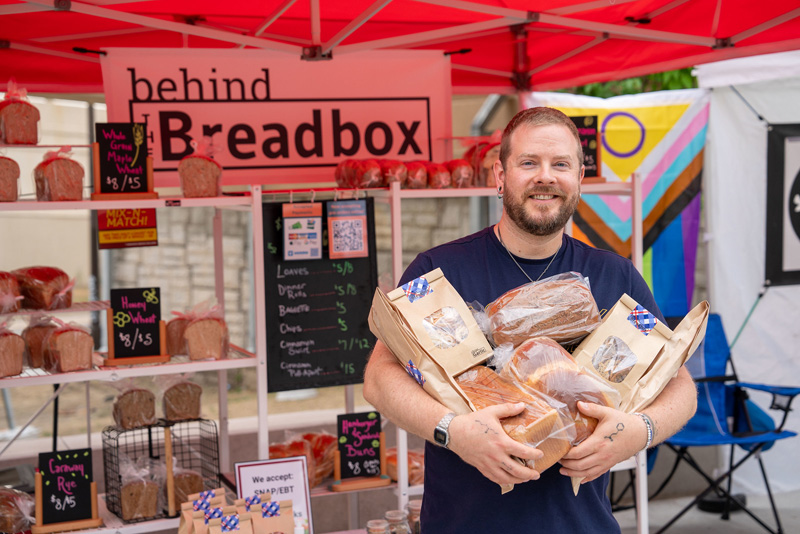Photographs by Joshua Feist
Tom Nechodomu loved his two decade-long career in education. He focused on instructional design and curriculum development, with stints in corporate work, consulting, the nonprofit sector, and higher education. But the work didn’t love him back: he suffered what he describes as a “breakdown from anxiety” and as a result, lost the vision in his right eye for several months.
“I realized that even though I loved what I was doing, it was too much,” he says. “I needed to do something different.”
That something different was starting a bakery. Baking bread was a longtime hobby (“I baked with my mom, my grandma, your standard Midwest story”) and Nechodomu launched Behind the Breadbox at the Cedar River Farmers Market in Austin, Minnesota in 2021. Last year, he moved to the Midtown Farmers Market in Minneapolis to cut down on the commute from his home in St. Paul.
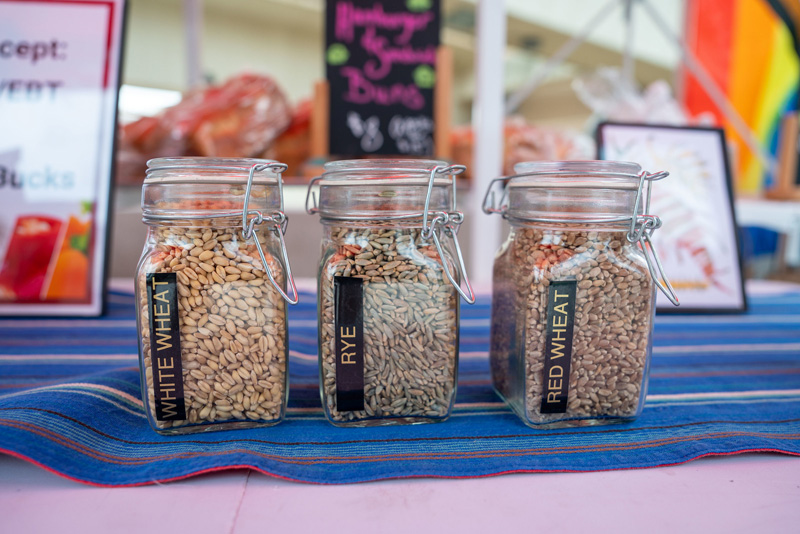
Since childhood, Nechodomu has been drawn to the wonder of yeasted breads. “There’s something kind of magical about mixing all the ingredients, and it comes to life,” he says. “It rises, and you form it, and it proofs, and then it bakes, and you get all these amazing holes and flavor—it’s just an amazing mix of science, food, and exploration.” With Behind the Breadbox, he’s expanded the exploration to include his ingredients.
“I’m a DIYer, and I’m a nerd—If I can do it myself, I want to try doing it myself at least once,” he says. It started with churning his own butter, which also gave him buttermilk as a byproduct. Next came milling his own whole wheat and rye flours, with grains sourced from an organic mill in Wisconsin. He beekeeps and harvests honey with a friend in New Brighton, and makes his own garlic salt with locally-grown organic garlic. The products he doesn’t make in-house are sourced locally or from companies that share his values, like maple syrup from a fellow farmers market vendor and white flour from King Arthur, an employee-owned certified B Corporation, which means that the company meets third-party standards for social and environmental performance.
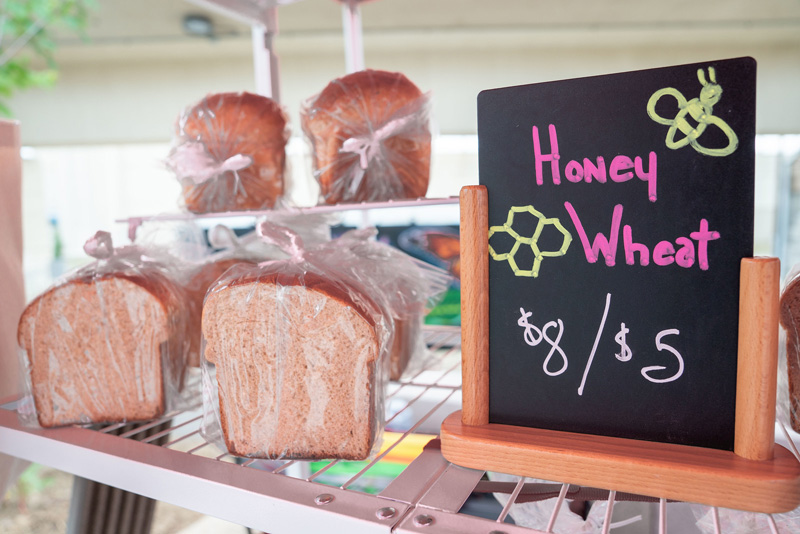
“It all started just because it was kind of fun to experiment, but it ended up being a really important part of my business model: keeping it as local as possible, having a small environmental impact, and having my hands in it as much as I can,” he says. “I want to create good bread that’s healthy and fresh.”
DAY-TO-DAY BREADS
The Behind the Breadbox product lineup is intentionally focused on what Nechodomu calls “everyday kitchen breads.”
“I don’t want my breads to be a special occasion,” he says. “I want people to replace their day-to-day breads, their grocery store breads, with mine—for sandwiches, toast, that baguette you grab on the way home.”
Sandwich-friendly loaves include whole grain maple wheat, honey wheat, caraway rye, and buttermilk white (“basically an adult Wonder Bread”). Nechodomu offers half-sized loaves to minimize waste for smaller households, as well as a mix-and-match option for customers who want a full loaf but with variety. The menu also includes cinnamon swirl bread, dinner rolls, baguettes, baguette chips, and a cinnamon pull-apart he describes as “like a babka, a caramel roll, and a monkey bread had a baby.”
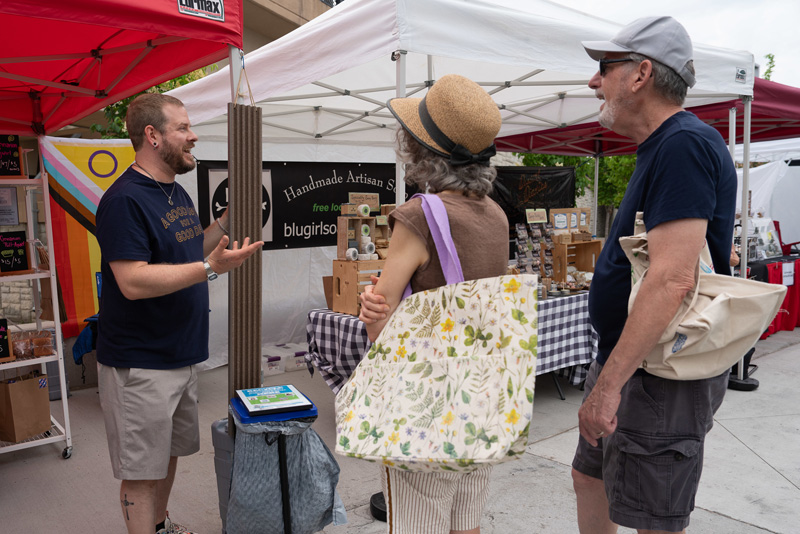
Nechodomu puts the same thought into the end of his products’ life as he puts into the beginning: one of the most unique aspects of Behind the Breadbox is the plastic bag recycling program, which he started towards the end of the 2022 market season. All of his breads are packaged in plastic to maintain freshness, but unfortunately, most of those bags end up in the trash—even when consumers try to recycle them. A recent investigation by ABC News revealed that the vast majority of plastic bags collected via in-store bag recycling bins at Target, Walmart, and other retailers actually end up in landfills and trash incineration facilities.
“Plastic bag recycling is so unique,” says Nechodomu. “[The bag] has to be clean and dry, and it has to be a specific kind of plastic.” He was able to find a local organization, Merrick, Inc., which provides work opportunities for people with disabilities and operates an on-site plastic recycling program. Each week, he collects bags at his farmers market stand, and then sorts them by hand to make sure they’re recyclable and delivers them to Merrick. Last year, he collected 25 pounds of plastic bags in two months; when we spoke in mid-June, he had already collected 27 pounds of plastic bags in five weeks.
Nechodomu offers his customers a special incentive to recycle Behind the Breadbox bags: for each of his own bags that gets returned for recycling, he donates $1 to the Corcoran Neighborhood Association, the nonprofit that founded the Midtown Farmers Market. Last year, he donated $162, and so far he’s at a donation total of $55 for 2023.
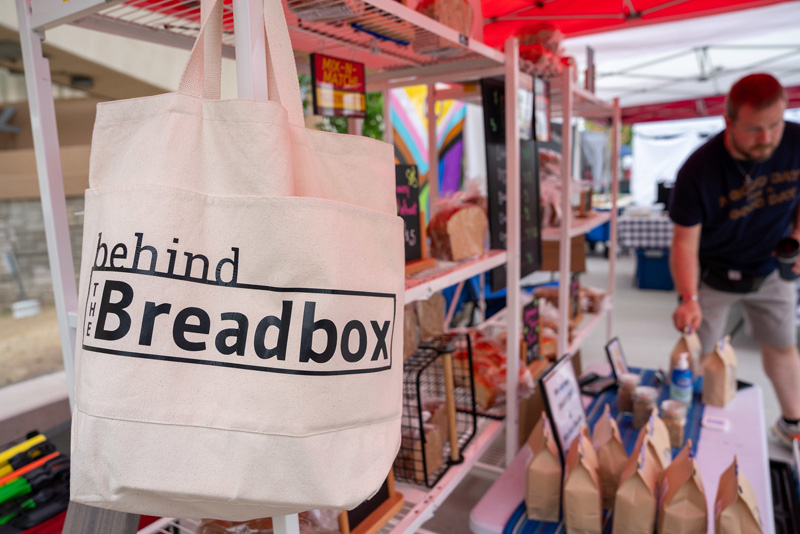
“A dollar a bag is a bit much, considering that a loaf is eight dollars, but the way I see it, I’m willing to keep it at a dollar until it’s no longer good for my business to give that much money back,” he says. “Right now, I feel like the education it’s doing and the number of people who are bringing me their bags of bags far outweighs any money that I donate…I’m trying to create a community of highly aware people who are able to give back and be responsible about a lot of different aspects.”
MATCHED WITH THE MARKETS
Nechodomu’s expansion plans for Behind the Breadbox don’t involve a brick-and-mortar bakery. Instead, he wants to move into a commercial kitchen space and expand his market presence to two markets per week.
“I really like that my storefront is a farmers market. It really matches the ethos of my company, and It matches who I am—it really has a good interpersonal connection.”
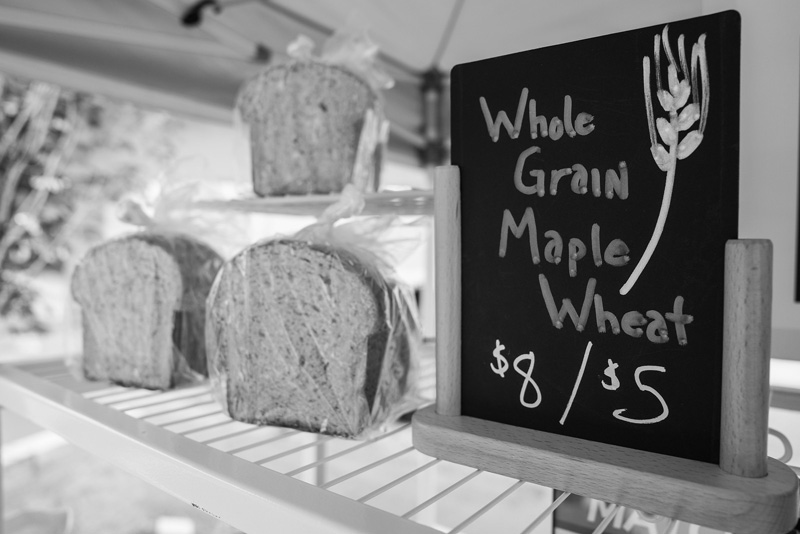
Baking in a commercial kitchen would also allow him to expand his bread donation program, which is currently an informal system of intentionally baking extra bread each week and giving it away to anyone who asks for it. His ultimate dream is to work with local food shelves and distribution networks to provide culturally-appropriate breads, so that those in need can enjoy the same fresh, locally-sourced bread as his farmers market customers.
This season, Behind the Breadbox is at the Minneapolis Midtown Farmers Market every Saturday from 8am to 1pm. Since Nechodomu frequently sells out, he encourages people to place pre-orders via his online shop for pickup at the market. Throughout the winter, Behind the Breadbox pops up at various markets and special events, and customers can also place orders via the online store.
A career in baking has clearly been good for Nechodomu’s mental health—his joy is palpable, whether he’s talking about perfecting his recipe for caraway rye or the time that a customer brought him nine pounds of plastic bags for his recycling program.
“I love what I do, and I feel really lucky to be able to do what I do. And I love when what I do makes other people feel and look the way I feel: happy.”

